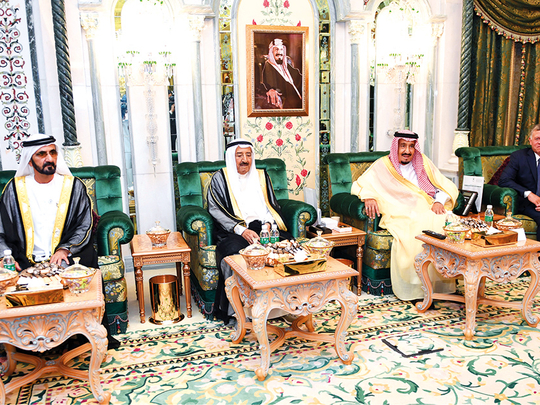
Dubai: Saudi Arabia, UAE and Kuwait’s pledge to aid Jordan with 2.5 billion dollars (Dh 9.19 billion) will assist the newly appointed Jordanian Prime Minister to focus on fixing the country’s economic policies, said analysts in Amman.
The Gulf aid, which is taking forms of supporting Jordan’s budget and reserves at the Central bank, came at the right time and slightly higher than expected, analysts said.
“It was the right move at the right time,” said Sa’ad Abu Dayeh, former diplomat and political science professor in Amman.
“Jordan was in dire need for such a support, as it was going through a very difficult time,” he told Gulf News.
“We were expecting an aid of 2 billion dollars (Dh 7.34 billion dirhams), and the nature of the aid this time differs from previous years,” said Waleed Al Khatib from the strategic Studies Center at the University of Jordan.
“This aid is directed at supporting the budget and the financial system, rather than for developmental projects or infrastructure, because the crisis that Jordan is facing is a credit crunch crisis,” Al Khatib told Gulf News in an interview.
He referred to the statement made by the outgoing Finance minister last week about not having the enough cash in the hands of the government to pay the salaries of government employees for this month.
Price hikes and plans to raise taxes sent thousands of Jordanians to the streets last week against the government’s economic policies.
Protestors called for the resignation of the government of Hani Al Mulki.
Jordan’s King Abdullah sacked Al Mulki and appointed a new prime minister, Omar Al Razaz, to form the new government.
Al Razaz said on Thursday he would drop a proposed income tax bill, a main demand of protesters.
The Gulf aid will offer Al Razaz the needed cushion and time to focus on his government’s economic policies, analysts said.
“Instead of dealing with the problem of generating the badly needed money, now he can focus on reforming the economic situations and reviewing the tax system”, said Al Khatib.
The Gulf aid’s package includes a deposit in Jordan’s central bank, guarantees to the World Bank, annual budget support for five years, and development projects, according to the statement carried by the Saudi state news agency, SPA.
The announcement came at the end of a summit held late Sunday in the holy city of Makkah in Saudi Arabia, where King Salman hosted a summit with Jordanian King Abdullah, Kuwait’s emir, Shaikh Sabah Al Ahmad Al Jaber Al Sabah, and UAE Vice President Sheikh Mohammed Bin Rashed.
Commenting on the aid, Jordanian economist Khalid Zubeidi said the details of how the aid would be divided are still not clear.
However, other analysts said these details are not for the King to discuss during the summit.
Al Khatib says the ministry of planning would probably be tasked to iron out the details.
But all analysts agree that the stability of Jordan is of uptmost importace to the Arab world.
“Jordan is like Switzerland in Europe, all its neighbors are stronger than it is,” said Abu Dayeh, adding that Amman has to deal with different parties throughout all previous crises and kept its distance.
“Jordan is where three hot spots and problems meet; the Palestinian, the Syrian and the Iraqi,” said Al Khatib.
One of the reasons behind its economic problems, he says, is the fact that Jordan hosts large number of Arab refugees, and its resources are limited.












